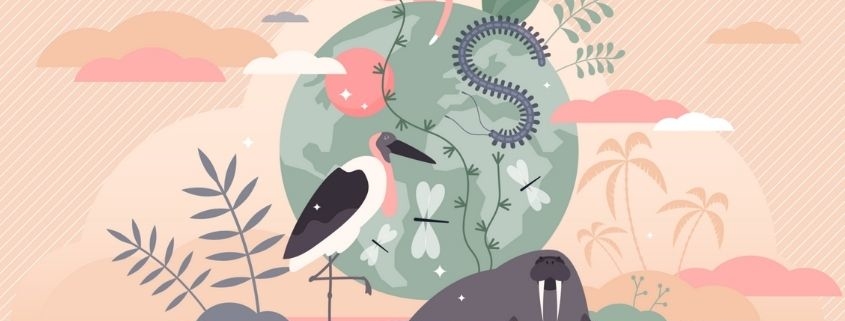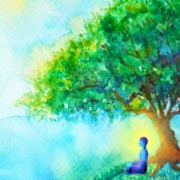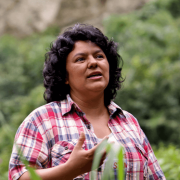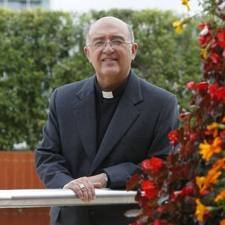Biodiversity As a Sacred Gift from God
BY THE COLUMBAN CENTER FOR ADVOCACY AND OUTREACH | August 30, 2021
“Each year sees the disappearance of thousands of plant and animal species which we will never know, which our children will never see, because they have been lost forever. The great majority become extinct for reasons related to human activity. Because of us, thousands of species will no longer give glory to God by their very existence, nor convey their message to us. We have no such right.”
These words come from Laudato Si’, Pope Francis’ 2015 encyclical letter on the environment. The encyclical reminds Catholics and all people of goodwill of something many of us forget about: that caring for our brother and sister species is fundamental to our lives as people of faith and as global citizens.

For centuries, we’ve behaved as if the creatures of this Earth do not have the same right to life and wellbeing as we do. Instead, our culture and church have adopted a perspective made famous by the French philosopher Renee Descartes.
Descartes believed that only human reason was linked to God and that animals are merely “automata” or machines. In the words of one of his followers, animals “eat without pleasure, cry without pain, grow without knowing it; desire nothing, fear nothing, know nothing.”
This spiritual violence that humans have committed against the world’s creatures is now playing out in the ecological crises we are witnessing today.
In 2019, for example, an international group of scientists predicted that up to one million plant and animal species face extinction due to human activities. This is hundreds, or even thousands, of times higher than the natural baseline rate and is more severe and longer lasting than any previous mass extinction event.

The emperor penguin is one of the million plant and animal species facing extinction due to climate change.
Another example is pandemics.
The colonization of Earth’s habitats for human use pushes wild animals into greater contact with humans, which increases the risk of pandemics. In little more than two decades, this has given us Covid-19, SARS, MERS, Ebola, HIV, Zika, and H1N1.
In response to these “cries of the earth and cry of the poor,” the Laudato Si’ Movement (formerly known as the Global Catholic Climate Movement) launched their “Healthy Planet, Healthy People Petition.”
The petition is clear that “our common home and our common family are suffering.” The COVID-19 crisis has been yet another alarming symptom of an ecological emergency. Humankind cannot be healthy on a sick planet.
The petition is partially intended for the UN Convention on Biological Diversity (CBD), which will convene world leaders at their meeting in October 2021 to evaluate the progress of the CBD’s Strategic Plan for Biodiversity 2011-2020. This plan is a critical opportunity for transformative action on biodiversity protections, resource mobilization, and capacity building.
While the forced extinction of animals and the massive destruction of the planet’s many ecosystems has ethical implications, we cannot ignore the spiritual dimension either.
Descartes’ idea about animals was a philosophical one as well as a theological one. He believed that only human reason was linked to God. But we know from the Hebrew Scriptures and the New Testament that this view is wrong.
Even the briefest glance at the Bible reveals God’s deep love for the Earth’s creatures.
For every animal of the forest is mine [God’s], beasts by the thousands on my mountains. I know every bird of the heavens; the creatures of the field belong to me. (Ps 50: 10-11)
Are not two sparrows sold for a small coin? Yet not one of them falls to the ground without your Father’s knowledge. (Mt 10:28-29)
Drawing on this biblical wisdom, St. Columban preached that “if you want to know the Creator, look at creation.” He believed that creation—animals, plants, ecosystems, and all natural things—is a sacred gift from God and that God is revealed to us through each member of creation.
Dr. John Feehan (a contemporary geologist, botanist, and educator working today) echoes St. Columban when he says:
[The Earth] is given to us, our unique privilege and responsibility, to care for the earth not as we would care for a garden in which we grow the vegetables that sustain us, but because it is the garden God walks in, and we have been invited to walk with him. We are placed in this Garden of Eden to share in God’s own wonder and delight at his creation.
If you look over the world as it is today, marred by deforestation and coral bleaching, is this how we want to treat the garden that God walks in?

Deforestation in the Amazon.
Laudato Si’ is prophetic because it realizes that at the root of the ecological crisis is a spiritual crisis. We no longer act as if we believe the Earth is God’s sacred creation.
“When I brought you into the garden land,” says God in the Book of Jeremiah “you entered and defiled my land.” (2:7)
Like the ancient Israelites then, we must learn again the ways of the Lord: to rest from toxic notions of productivity and growth, to liberate ourselves and others from economic exploitation, and to restore the fruitfulness and wellbeing of all creatures.
Only when we build a culture that recognizes that all creatures are holy, will we truly know God and the salvation God promises.
Take action today—join with the Laudato Si’ Movement and ask world leaders to take transformative action to address the climate crisis and to protect biodiversity. Learn more and sign on to the Healthy Planet, Healthy People Petition here.
The Columban Center for Advocacy and Outreach stands in solidarity with those who are marginalized and made poor, including the Earth. Based in Washington, D.C., and El Paso, TX, the Columban Center equips Catholics with the tools for advocacy and social change.
To learn more about the intersection of biodiversity and other themes of Catholic Social Teaching, listen to Jubilee for the Earth wherever you get your podcasts.









“You are not Atlas carrying the world on your shoulder. It is good to remember that the planet is carrying you.” – Vandana Shiva
It was so good to see you acknowledging this topic, it really feels great. Thanks for sharing such valuable information which is very hard to find normally.Celebrity Leather Jackets
This thought-provoking blog post on biodiversity as a sacred gift from God explores the interconnectedness of nature and spirituality, reminding us of the importance of preserving our planet’s diverse ecosystems. Just like Ricky Bobby Jacket, this insightful piece serves as a vibrant reminder to embrace and protect the precious gifts of nature for future generations
The content was really very interesting. I am really thankful to you for providing this unique information You have a good point here! I totally agree with what you have said!! Thanks for sharing your views. Blade Runner Coat
Hope more people will read this article keep up the good work This Article is Awesome. It’s help me a lot. Please keep up your good work. We are always with you and Waiting for your new interesting articles Blade Runner 2049 Jacket
Your article is very helpful for me. I hope you will continue to write such good articles as well. Purple Bape Hoodie
I hope you will continue to write such good articles as well. google
I really appreciate you sharing this useful material, and I wish you would continue to do so. I learned a lot from your article. My thoughts are greatly influenced by your post. I’m selling this product Mens Sheepskin Coat in USA.
“Moving out is never easy; it’s like closing a chapter of your life. Whether it’s leaving a beloved home or a special place filled with memories, there’s always a bittersweet feeling. It’s a reminder of the beauty of impermanence in our lives.Click here While the anticipation of new adventures can be exciting, saying goodbye to cherished spaces is a poignant experience.
Biodiversity truly is a sacred gift from God, a testament to the beauty and wonder of creation. Let’s cherish and protect it for future generations.
I completely resonate with your perspective. electric breast pump in pakistan Your insights have added valuable depth to the discussion.